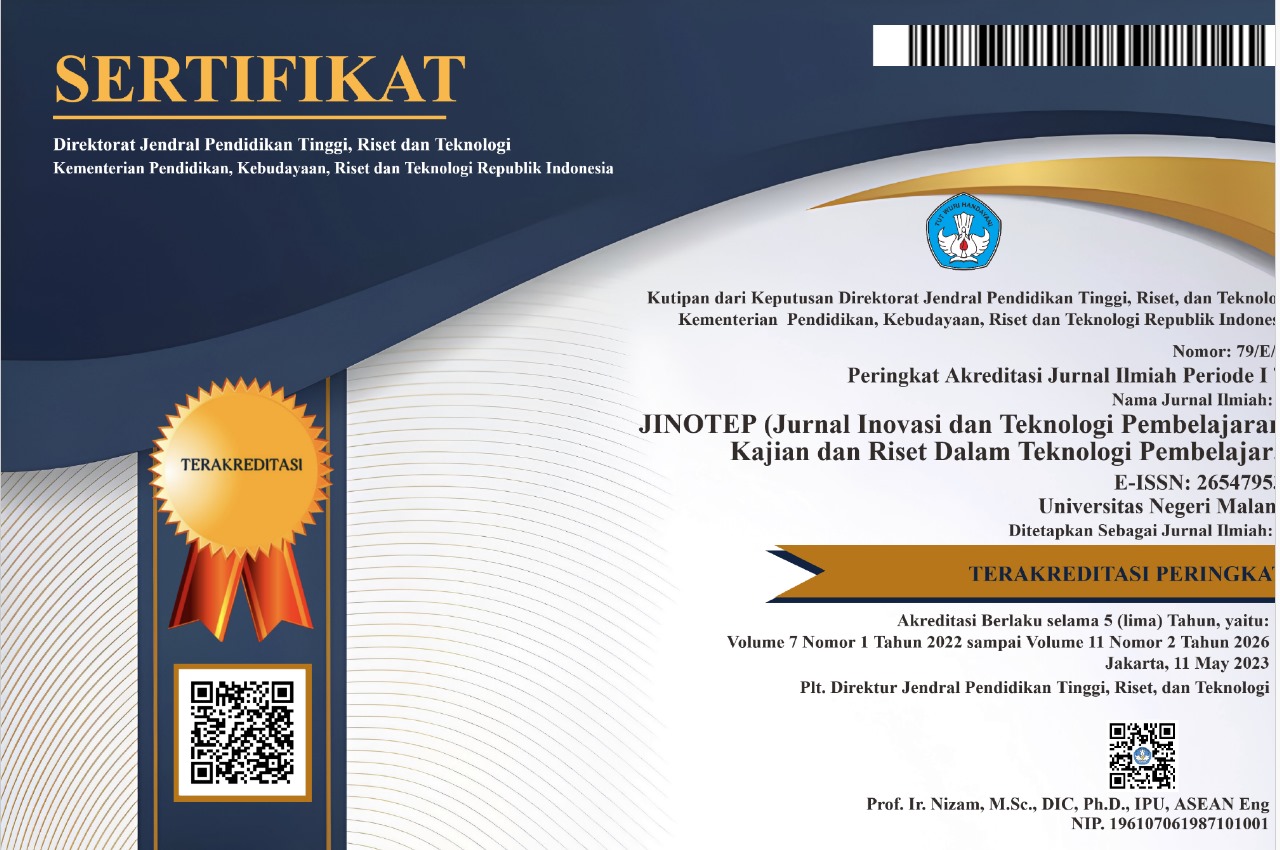Developing Authentic Assessment Rubric for Assessing 5th Grade Elementary School Students at Buleleng Regency
Abstract
Abstrak: Penelitian ini bertujuan untuk mengembangkan rubrik penilaian otentik dengan mengadopsi beberapa metode pembelajaran yang bersesuaian dengan pembelajaran abad ke-21 menggunakan model Desain dan Pengembangan disertai tahapan ADDE. Subjek dalam penelitian ini adalah guru dan siswa kelas 5 SD di Kabupaten Buleleng. Terdapat beberapa jenis instrumen yang diterapkan dalam mengumpulkan data, yaitu observasi, wawancara, kuesioner, dan analisis dokumen, selanjutnya dianalisis dengan mixed method analisis data. Dari keseluruhan pengujian atau proses evaluasi diperoleh bahwa rubrik yang telah dikembangkan dinyatakan sebagai rubrik penilaian yang sangat baik oleh tiga ahli dan satu guru penilai, serta dikatakan baik oleh satu hasil evaluasi guru. Dengan demikian dapat disimpulkan bahwa rubrik yang telah dikembangkan layak digunakan untuk menilai proses belajar mengajar Bahasa Inggris kelas 5 SD baik dari segi proses, kinerja, maupun produk yang dihasilkan.
Abstract: This study aimed to develop an authentic assessment rubric by adopting several learning methods that are appropriate to 21st century learning using the Design and Development model accompanied by the ADDE stages. The subjects in this study were teachers and students of grade 5 elementary school in Buleleng Regency. Several instruments were applied in collecting data, including observations, interviews, questionnaires, and document analysis, which were then analyzed using mixed method data analysis. The rubric developed was declared very good by three experts and one teacher assessor; and good by one teacher's evaluation results. Thus, it can be concluded that the rubric that has been developed is appropriate to be used to assess the teaching and learning process of 5th grade English in terms of process, performance, and the resulting product.
Keywords
Full Text:
PDFReferences
Angelianawati, L. (2019). Being an englishteacher in industrial revolution 4.0: an overview about roles, challenges, and implications. Jurnal Dinamika Pendidikan, 11(3), 307-316. https://doi.org/10.33541/jdp.v11i3.896
Aziz, M. N. A., Yusoff, N. M., & Yaakob, M. F. M. (2020). Challenges in using authentic assessment in 21st century ESL classrooms. International Journal of Evaluation and Research in Education, 9(3), 759–768. https://doi.org/10.11591/ijere.v9i3.20546
Benson, S. K., Therrien, W. J., Lovette, G. E., Doabler, C., & Longhi, M. (2022). Rubrics: useful beyond assessments. Science and Children, 59(5), 52–56.
Burdina, G. M., Krapotkina, I. E., & Nasyrova, L. G. (2019). Distance learning in elementary school classrooms: An emerging framework for contemporary practice. International Journal of Instruction, 12(1), 1–16. https://doi.org/10.29333/iji.2019.1211a
Chowdhury, F. (2018). Application of rubrics in the classroom: a vital tool for improvement in assessment, feedback and learning. International Education Studies, 12(1), 61-68. https://doi.org/10.5539/ies.v12n1p61
Churiyah, M., & Sakdiyyah, D. A. (2020). Indonesia education readiness conducting distance learning in COVID-19 pandemic situation. International Journal of Multicultural and Multireligious Understanding (IJMMU), 7(6), 491–507.
Gulmez, I., & Ortaokulu, Y. B. (2018). Implementation of project-based learning in secondary schools. International Journal of Scientific and Technological Research Www.Iiste.Org ISSN, 4(6), 89–106.
Hadi, M. S., & Izzah, L. (2019). Problem based learning (PBL) in teaching english for students of primary school teacher education department. English Language in Focus (ELIF), 1(1), 45-54. https://doi.org/10.24853/elif.1.1.45-54
Herdiawan, R. D., & Java, W. (2017). Evaluating the assessment rubrics of an english course. Language Circle: Journal of Language and Literature, 12(1), 75–82. https://doi.org/10.15294/lc.v12i1.11471
Joshi, A., Virk, A., Saiyad, S., Mahajan, R., & Singh, T. (2020). Online assessment: Concept and applications. Journal of Research in Medical Education & Ethics, 10(2), 49-59. https://doi.org/10.5958/2231-6728.2020.00015.3
Lase, D. (2019). Education and industrial revolution 4.0. Handayani Journal PGSD FIP Unimed, 10(1), 48–62. https://doi.org/10.24114/jh.v10i1.14138
Luciana, N. L. R. (2020). Teachers’ readiness in inserting the 21st century skills in the lesson plan in teaching english. Jurnal Pendidikan Dan Pengajaran, 53(2), 168-183. https://doi.org/10.23887/jpp.v53i2.26406
Marhaeni, A. A. I. N., & Kusuma, I. P. I. (2017). Analisis implementasi asesmen autentik pada pembelajaran bahasa inggris dalam implementasi kurikulum 2013 di SMA di Bali. Seminar Nasional Riset Inovatif 2017, 555–561.
Nartiningrum, N., & Nugroho, A. (2020). Online learning amidst global pandemic: efl students’ challenges, suggestions, and needed materials. English Franca : Academic Journal of English Language and Education, 4(2), 115-140. https://doi.org/10.29240/ef.v4i2.1494
Nurkancana, W., & Sunartana. (1992). Evaluasi hasil belajar. Usaha Nasional.
Oktaviani, A., & Fauzan, A. (2017). Teachers perceptions about the importance of english for young learners. Linguistic, English Education and Art (LEEA) Journal, 1(1), 1–15. https://doi.org/10.31539/leea.v1i1.25
Padang, I. B. (2020). Journal of Research on English and Language Learning. 1(2), 142–148.
Reynolds-Keefer, L. (2010). Rubric-referenced assessment in teacher preparation: An opportunity to learn by using. Practical Assessment, Research, and Evaluation, 15(1), 8-17. https://doi.org/10.7275/psk5-mf68
Rodr, J. (2010). Task-based language learning: old approach, new style. a new lesson to learn. Task-Based Language Learning: Old Approach, New Style. A New Lesson to Learn, 12(2), 165–178.
Sarimanah, E., Dewi, F. I., Efendi, R., Suhendra, S., Nurul, M., & Soeharto, S. (2019). The implementation of discovery learning models in enhancing speech script writing skills for students. Lingua Cultura, 13(2), 145-150. https://doi.org/10.21512/lc.v13i2.5613
Setiawan, B., & Iasha, V. (2020). Covid-19 pandemic: the influence of full-online learning for elementary school in rural areas. Jurnal Pendidikan Sekolah Dasar, 6(2), 114–123.
Sofeny, D. (2017). the Effectiveness of discovery learning in improving english writing skill of extroverted and introverted students. Jurnal Penelitian Humaniora, 18(1), 41-46. https://doi.org/10.23917/humaniora.v18i1.3639
Surahman, E., Kurniawan, C., & Pratama, U. N. (2021). The appropriate remote learning methods during the covid-19 pandemic in rural schools in indonesia. International Conference on Information Technology and Education (ICITE 2021), 120–127. https://doi.org/10.2991/assehr.k.211210.020
Surahman, E., & Wang, T. H. (2022). Academic dishonesty and trustworthy assessment in online learning: a systematic literature review. Journal of Computer Assisted Learning, inpress. https://doi.org/10.1111/jcal.12708
Ulen, T. S. (2010). The role of law in. Program, 13(39), 1–39.
Ulfa, S., Fattawi, I., Surahman, E., & Yusuke, H. (2019). Investigating learners’ perception of learning analytics dashboard to improve learning interaction in online learning system. 2019 5th International Conference on Education and Technology (ICET), 49–54. https://doi.org/10.1109/ICET48172.2019.8987229
Venera, U. (2017). The design and use of speaking assesment rubrics. Journal of Education and Practice, 8(32), 135–141.
Yildiz, M., & Senel, M. (2017). Teaching grammar through task-based language teaching to young efl learners. Reading Matrix: An International Online Journal, 17(2), 196–209.
Yulianto, D., & Mujtahid, N. M. (2021). Online assessment during COVID-19 pandemic: EFL teachers’ perspectives and their practices. JET (Journal of English Teaching), 7(2), 229–242. https://doi.org/10.33541/jet.v7i2.2770
DOI: http://dx.doi.org/10.17977/um031v9i22022p126
Refbacks
- There are currently no refbacks.
Copyright (c) 2022 Luh Metri Sulistya Sudeni, Putu Kerti Nitiasih, Luh Gd Rahayu Budiarta

This work is licensed under a Creative Commons Attribution-ShareAlike 4.0 International License.
======================================================================
Jurnal Inovasi dan Teknologi Pembelajaran published by Universitas Negeri Malang in collaboration with the Asosiasi Program Studi Teknologi Pendidikan Indonesia (APS TPI) and Ikatan Profesi Teknologi Pendidikan Indonesia (IPTPI) with a MoU.
Publisher Address:
Educational Technology Laboratorium, Building D5, 1st Floor
Faculty of Education, Universitas Negeri Malang
Semarang St. No. 5, Malang City, East Java Province, Postal Code 65145
Email: jinotep.fip@um.ac.id
======================================================================

JINOTEP is licensed under a Creative Commons Attribution-ShareAlike 4.0 International License.
JINOTEP Statistics (Since July 13th, 2020)



.png)




.png)
1.png)
1.png)
4.png)
2.png)
1.png)
1.png)
.png)


_3.png)





1.png)
.png)